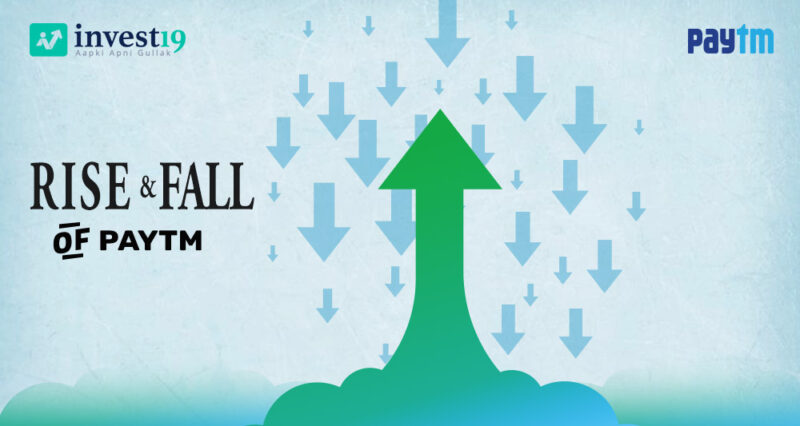Paytm valuation crashes below Rs70,000crores
PAYTM app become a household name for digital payments, which was launched in the year 2009. It is one of the largest digital payment platforms in the country and the most valuable startup. As per the data, as of 31st, March 2021 the company has a 333 million+ client base and 21 million+ registered merchants to whom, the firm, offers payment services, financial services, and e-commerce and cloud services. The firm has something for everyone, whether you are an end-user or a merchant. In the past decades, we can hardly find anyone in the country, who hasn’t used the services of PAYTM.
On the 8th November 2021 almost after two-decade, the biggest, Paytm India opened the biggest ever IPO of the Indian stock market to raise a whopping amount of Rs18,300 crores, which consisted of a fresh issue of Rs8,300 crores and Rs10,000 crores under offer for sale, with a price band of Rs 2,080-2,150. The shares received a tepid response with 1.9 times subscription. Shares were allotted for Rs 2150.
Paytm share prices fell from the allotment price of Rs2150 to a low of Rs 1560, on debut day.
- Paytm before its shares made debut on exchange seek a valuation of Rs 1.49 trillion($20 billion).
- Listing day, the Paytm shares made a lackluster debut with its listing at Rs 1929, down by 10.27%,
- On listing day itself, the share prices touched a low of Rs1560 on the same day and market capitalization came down to Rs70,418 crore.
Since the day of listing, Paytm has been struggling to touch its allotment price. There has been a continuous fall in the prices of Paytm and thus its valuation.
Within 9 weeks of its debut, shares prices have touched the low of Rs 1025.05, taking its valuation further down to Rs68,960crores, almost half the valuation it sought before making its market debut. Major reasons for this drop in the prices are:
- Macquarie India, a brokerage firm came out with a report on Paytm, which gave an “underperform” rating to the digital payment platform and reduced its target price below 1K to Rs 900.
- Macquarie India from its previous target price of Paytm of Rs1200 reduced it further to Rs 900 stating the weak business model of Paytm, as a major reason for downgrading the rating of the firm.
- The Macquarie India firm reported Paytm as a cash guzzler and has also raised a question on the scale and profitability of the business.
- Rejection of Paytm’s foray into insurance by the Insurance Regulatory and Development Authority dented the market sentiment for Paytm.
- Further weighing on the prices of the shares is the regulations and policy to come in place for the digital payment platform proposed by RBI. Any such regulation may further hinder the overall performance of the digital payment platform. 70% of Paytm’s business is still dependent on digital payments. Any such cap by regulatory authorities will prove to be hurting for Paytm’s business.
There seems no relief for the Paytm investors, despite the rise in gross merchandise value and increase in loan disbursal as reported by PAYTM in Q3 reports and also rise in loan disbursals to 44 lakh loans worth Rs 2,180 crore in Q3, as against 8.8 lakh loans worth Rs 470 crore in the year-ago period, share prices failed to bounce back, rather it slipped to the low of Rs 1025.05, on 13 Jan2022. Gross merchandise value is also reported at 2.5lakh crores as against Rs 1.12 lakh crore for the same period a year ago, but couldn’t provide cushion to the falling share prices of Paytm.
Investors must stay cautious before investing in Paytm. Stability can be seen in the price of Paytm near Rs800-Rs850 and sustainability near this price may indicate a green light for the share price of the digital payment platform Paytm. But investors must keep an eye on new regulations to be laid down by the apex bank of the country, the Reserve Bank of India on digital payment platforms and wallet charges. Any capping on charges or new regulation, which might affect the revenue of Paytm will have an adverse impact on the share prices and this may further push the prices down.
